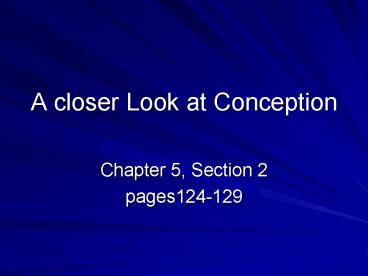A closer Look at Conception - PowerPoint PPT Presentation
1 / 23
Title:
A closer Look at Conception
Description:
GENETICS - The study of the way animals & plants pass on to their ... Polycystic ovary syndrome (PCOS) endocrine disorder. affects approximately 5% of all women ... – PowerPoint PPT presentation
Number of Views:54
Avg rating:3.0/5.0
Title: A closer Look at Conception
1
A closer Look at Conception
- Chapter 5, Section 2
- pages124-129
2
Objectives
- Describe how personal Characteristics are
inherited - Explain how multiple births occur
- Discuss possible solutions for infertility
3
- READ The genetic package on page 124-125
4
- GENETICS - The study of the way animals plants
pass on to their offspring such as - eye color, hair color, height, body build, blood
types, intelligence, gender, etc. - HEREDITY - Characteristics that a child receives
from both parents
5
Heredity, Environment, or Both
- Hair color
- Eye color
- Skin color
- Health
- Personality
- Strength of eyesight
- Physical strength
- Relationship with family
6
Heredity, Environment, or Both
- Relationship with friends
- Level of education
- Gender
- Body type
- Weight
- Religious Involvement
- IQ
- Height
- Blood Type
7
- CELL Basic unit of all living matter (Adult
over 10 trillion cells)
CYTOPLASM Substance of a cell outside of the
nucleus
NUCLEUS Central point of cell / contains genetic
coding for maintaining life systems and issuing
commands for growth reproduction
CHROMOSOMES 46 in each Nucleus (23
pairs) GENES bands on chromosomes (thousands of
genes) DNA on genes (billions of DNA)
8
? ? ? ? ? ? ? ?
- How many chromosomes are there in each cell?
- 46 CHROMOSOMES or 23 PAIRS
- How many chromosomes are in Reproductive (egg
sperm) or Germ cells? - 23 CHROMOSOMES
- (combined the 46 chromosomes)
9
CELL DIVISION
- MITOSIS Cell divides by copying the DNA - cell
splits - new cell with normal number of
chromosomes (Cell growth repair) - MEIOSIS Creates 1/2 sets of chromosomes
- Women 23 Men 23 Combined 46
10
SEX DETERMINATION
- Read page 126 in the text
11
WHO DETERMINES THE SEX OF A BABY?
- Female Sex Cells XX (Ovum or Egg)
- Male Sex Cells XY (Sperm)
- Baby Girl XX Baby Boy XY
- Conception is the union of an OVUM and the SPERM
- Gender is determined by the father!
12
- DOMINATE Gene More powerful - trait seen in
person - RECESSIVE Gene Weaker and hides in the
background. Trait can only determine when two of
them are present - may show up in future
generations. - CARRIER Has a recessive gene that is not visible
- SEX-LINKED Mother passes the recessive X to son
- Color-blind male receives the trait from his
mother. - The mother is usually not color-blind herself.
13
- B BROWN eyes (dominate) b BLUE eyes
(recessive) - BB BROWN eyes
- bb BLUE eyes
- Bb BROWN eyes but carry the recessive BLUE eye
gene
14
Multiple Births
- Read pages 126-127
15
MULTIPLE BIRTHS
- ZYGOT the cell that is formed when a sperm
fertilized an egg (ovum) - MONOZYGOT Identical Twins 1 Egg 1 Sperm
- Fertilized ovum splits into 2 identical cells -
Always the same gender - DIZYGOT Fraternal Twins 2 Eggs different
Sperm - Will look different - May be different or the
same gender - MULTIPLE BIRTHS More than 2
- May be identical, fraternal or both - May be
different or the same gender - CONJOINED (Siamese) TWINS Ovum splits apart, but
the separation is not completed. Babies are
joined at some part of their bodies.
16
Factors in Multiple Pregnancy
- Heredity
- Race
- Number of prior pregnancies
- Delayed childbearing
- Infertility treatment
17
(No Transcript)
18
(No Transcript)
19
(No Transcript)
20
(No Transcript)
21
Jon and Kate Gosselin
22
- Polycystic ovary syndrome (PCOS) endocrine
disorder - affects approximately 5 of all women
- all races and nationalities
- most common hormonal disorder among women of
reproductive age, and is a leading cause of
infertility.23
23
(No Transcript)































